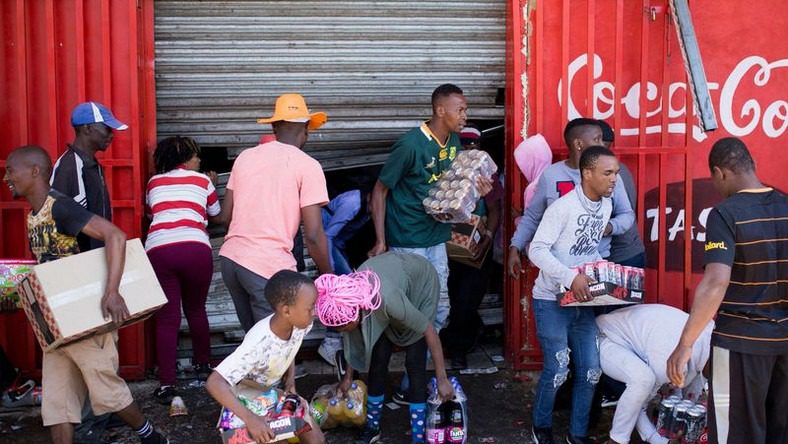Forgotten Dairies
South Africa, Ghana and Xenophobia -By Zayd Ibn Isah
But Ghana is the last country one would expect to have xenophobic tendencies towards Nigeria in this age. After all, they are the closest people to us. Ghanaians and Nigerians are like brothers and sisters. If you have ever witnessed a Nigeria–Ghana banter on social media, especially on X (formerly Twitter), you would understand why I say they are closest to us. Is it the competition over whose jollof rice is better, which has gained global attention? Or the never-ending football rivalry that always sparks playful arguments? At the end of the day, there is always genuine brotherhood beneath the banter.

Mark Twain once remarked that “history doesn’t repeat itself, but it often rhymes.” Once upon a time, in 1983, then-President Shehu Shagari signed an executive order deporting irregular migrants back to their countries. Ghanaians were the worst hit, as over a million of them fell victim to Shagari’s sledgehammer.
For the “Indomie generation,” nothing Donald Trump of America is doing now with immigration policy is new. As we like to say in Nigeria, “Naija no dey carry last”. We were setting precedents long before Donald Trump.

Say No To Xenophobia In South Africa, Ghana
When our country had plenty of money from oil in the ’70s and early ‘80s, we were generous to many African countries such that we became the “big brother” of Africa. People from across the continent migrated to Nigeria in search of greener pastures. Some even came illegally, just like our compatriots today who risk their lives crossing the Mediterranean Sea into Europe. That was how attractive Nigeria was back then.
According to my findings, President Shehu Shagari took the hard decision on undocumented migrants, mainly from West African countries, due to economic crisis and growing security concerns in some parts of the country, the foremost example being the Kano riots. A robbery incident involving Ghanaians also fueled Shagari’s decision, which strained diplomatic ties between Nigeria and Ghana and drew international criticism.

South Africans destroying and looting Nigerian shops
The executive order came with an ultimatum, and Shagari showed he meant business in spite of the condemnation. Families left the country with their belongings packed in a checkered tote bag, which became known as “Ghana Must Go.” Although not many Nigerians supported Shagari’s decision, fast forward to 2025, the tables have turned. Nigerians in Ghana are now at the receiving end of the treatment Ghanaians faced in 1983. The difference is that Ghanaians were told to leave Nigeria by an executive order, but today it is Ghanaian youth who are taking the bull by the horns against Nigerians. Their claim is that Nigerians are polluting their country with crimes and criminality, but there is more to the “Nigerians Must Go” protest in Ghana than meets the eye.
Ghanaians may feel it is payback time, but Nigeria did not even start this deportation cycle. Before President Shehu Shagari’s executive order, there was Akwasi Afrifa’s Aliens Compliance Order, under which many Nigerian migrants, mainly Yorubas, were deported from Ghana due to economic concerns, high unemployment, and a desire to control the immigrant population. But Ghana and Nigeria’s relationship has gone past that era of deportation and counter-deportation, as the two countries continued to maintain good diplomatic relations. It is unfortunate that some Ghanaians want to take us back to that era of mutual suspicion.

Looting of Nigerian shops in South Africa
The xenophobia against Nigerians has been going on since 2017, according to a report I read in The Punch. In that report, a young man who was interviewed said people are just getting to know about it now, but in 2019 the protest against Nigerians in Ghana was so strong that shops had to be closed.
The new wave of protest against Nigerians in Ghana started with an Igbo king whose flamboyant lifestyle does not sit well with some Ghanaians. It began with the recirculation of an old video where he expressed his desire to build an Igbo village in Ghana and even claimed to have purchased land for that purpose. Although he has since told the Ghanaian government that he has jettisoned the plan, protesters in Ghana were determined to make a mountain out of a molehill. They needed something to hold on to—a justification for their actions. Their bloggers recirculated the video, and it spread like wildfire, sparking outrage. Now, things have fallen apart.
In the midst of this crisis, I pity one man who is at the centre of it all. At this moment, I would not wish to be in the shoes of Ghana’s President, John Dramani Mahama, who was raised in Nigeria by his stepmother, a Yoruba woman. He is torn between calling his people to order, only to be accused of being sympathetic towards Nigerians because of his ties to us, or supporting the calls for Nigerians to leave Ghana, in which case he would be accused of ingratitude.
But Ghana is the last country one would expect to have xenophobic tendencies towards Nigeria in this age. After all, they are the closest people to us. Ghanaians and Nigerians are like brothers and sisters. If you have ever witnessed a Nigeria–Ghana banter on social media, especially on X (formerly Twitter), you would understand why I say they are closest to us. Is it the competition over whose jollof rice is better, which has gained global attention? Or the never-ending football rivalry that always sparks playful arguments? At the end of the day, there is always genuine brotherhood beneath the banter.

Basil Onuigbo, a victim of Xenophobia whose shop was burnt down
It is so sad Nigerians are now subjected to xenophobic attacks in different places. For so long in South Africa, we have been subjected to inhumane and degrading treatment by lawless citizens who feel Nigerians are “doing too much” in their country. Add the situation in Ghana to it and it becomes clear that this is now a case of Fela’s “double wahala for deadi bodi.”
Some of the reasons for these xenophobic attacks are crimes. In Ghana, Nigerians are accused of fraud, prostitution, and even ritual killings. Likewise in South Africa. But there is another factor—resource control. You can’t deny the fact that Nigerians are hardworking people. Anywhere we go, we tend to dominate; our spirit is special. Of course, there will always be a few bad eggs who give the country a bad name, but that does not mean every Nigerian living in Ghana or South Africa should be tarred with the same brush. After all, no country has the monopoly of crime; even first-world countries are not left out. Recently, the Nigerian government deported dozens of foreigners, including 50 Chinese nationals, in a major crackdown on one of the largest foreign-led cybercrime syndicates. Are we going to start attacking other hardworking Chinese living in Nigeria, or the Lebanese who are already competing with us in the food and hospitality business, because of the actions of a few bad eggs among them? How would the world see us when we say we are good people and a great nation, yet we are xenophobic?
For us to still be talking about xenophobia in Africa in this modern era is a sign that the labours of Pan-African heroes like Nelson Mandela and Kwame Nkrumah have gone in vain. How then can we actualise the dream of a United States of Africa, a dream that Muammar Gaddafi of Libya and other Pan-Africanist leaders held dear, when there is no love lost between sons and daughters of Africa? This is a wake-up call for the African Union and ECOWAS.
African governments must invest more in public enlightenment campaigns to remind their citizens that no African is a foreigner in Africa. The enemy is not the Nigerian trader in Accra or the Ghanaian shopkeeper in Lagos, but bad governance and laziness. Instead of South Africans or Ghanaians accusing hardworking foreigners in their countries of taking over their jobs and businesses, they should either work harder or redirect their anger towards their governments.
At the end of the day, xenophobia will never solve Africa’s problems; it will only deepen our wounds and set us back decades. If Ghanaians think that by pursuing Nigerians out of their country, Ghana will suddenly become a utopia free of crime, they are chasing an illusion. The same goes for South Africans. What we need is unity, collaboration, and a shared sense of responsibility to build the Africa of our dreams. Until we begin to see ourselves first as Africans before identifying with our nationalities, the dream of a united continent will remain a mirage. The world is watching, and history will not forgive us if we allow hate to destroy the brotherhood our founding fathers fought so hard to establish.
That said, the xenophobia in Ghana points to what I and other concerned citizens keep saying: this country is all we have, and we should love and cherish it both at home and abroad. Although there is nothing wrong with migrating legally to seek greener pastures, as even citizens of first-world countries migrate, there is something wrong in how some of us denigrate Nigeria while abroad. What Nigerians who rubbish the image of Nigeria fail to understand is that, no matter how long you live in another man’s land, even if you become a citizen, you will always be regarded as a stranger.
In an interview I watched between one of the Nigerians in Ghana and the popular activist known as VeryDarkMan (VDM), the man said he has lived in Ghana for 25 years and his wife is even Ghanaian, yet they still harassed him and forced him to close his shop. Even the girl from Essex whose main hobby is speaking badly about Nigeria recently cried out that she is under attack from British racists over her race and ethnicity. Instead of sympathy, she was reminded of her own words against Nigeria and other immigrants. That, indeed, is the chicken coming home to roost—a lesson for all of us, whether at home or abroad.
Zayd Ibn Isah can be reached at lawcadet1@gmail.com










